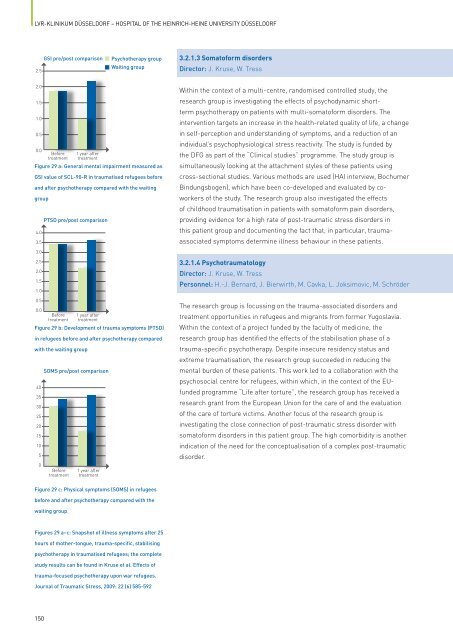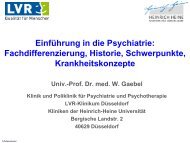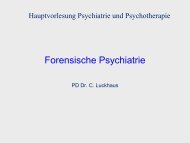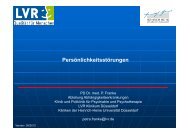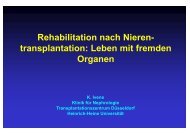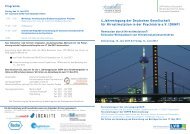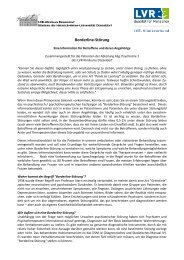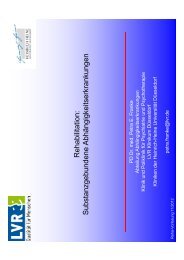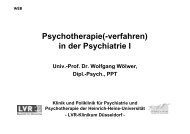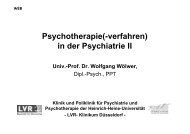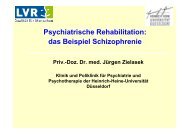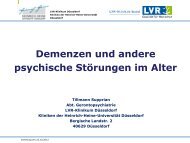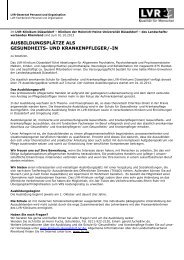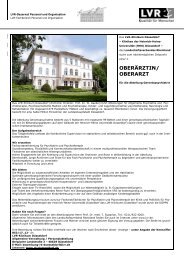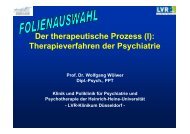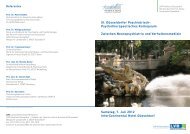LVR-Klinikum Düsseldorf Hospital of the Heinrich-Heine University ...
LVR-Klinikum Düsseldorf Hospital of the Heinrich-Heine University ...
LVR-Klinikum Düsseldorf Hospital of the Heinrich-Heine University ...
Create successful ePaper yourself
Turn your PDF publications into a flip-book with our unique Google optimized e-Paper software.
<strong>LVR</strong>-KLINIKUM DÜsseLDORF – hOsPITaL OF The heINRIch-heINe UNIVeRsITY DÜsseLDORF<br />
2.5<br />
2.0<br />
1.5<br />
1.0<br />
0.5<br />
0.0<br />
Before 1 year after<br />
treatment treatment<br />
Figure 29 a: General mental impairment measured as<br />
GSI value <strong>of</strong> SCL-90-R in traumatised refugees before<br />
and after psycho<strong>the</strong>rapy compared with <strong>the</strong> waiting<br />
group<br />
4.0<br />
3.5<br />
3.0<br />
2.5<br />
2.0<br />
1.5<br />
1.0<br />
0.5<br />
0.0<br />
Figure 29 b: Development <strong>of</strong> trauma symptoms (PTSD)<br />
in refugees before and after psycho<strong>the</strong>rapy compared<br />
with <strong>the</strong> waiting group<br />
40<br />
35<br />
30<br />
25<br />
20<br />
15<br />
10<br />
5<br />
0<br />
Figures 29 a–c: Snapshot <strong>of</strong> illness symptoms after 25<br />
hours <strong>of</strong> mo<strong>the</strong>r-tongue, trauma-specific, stabilising<br />
psycho<strong>the</strong>rapy in traumatised refugees; <strong>the</strong> complete<br />
study results can be found in Kruse et al. Effects <strong>of</strong><br />
trauma-focused psycho<strong>the</strong>rapy upon war refugees.<br />
Journal <strong>of</strong> Traumatic Stress, 2009: 22 (6) 585-592<br />
150<br />
GSI pre/post comparison<br />
PTSD pre/post comparison<br />
Before 1 year after<br />
treatment treatment<br />
SOMS pre/post comparison<br />
Before 1 year after<br />
treatment treatment<br />
Psycho<strong>the</strong>rapy group<br />
Waiting group<br />
Figure 29 c: Physical symptoms (SOMS) in refugees<br />
before and after psycho<strong>the</strong>rapy compared with <strong>the</strong><br />
waiting group<br />
3.2.1.3 Somat<strong>of</strong>orm disorders<br />
Director: J. Kruse, W. Tress<br />
Within <strong>the</strong> context <strong>of</strong> a multi-centre, randomised controlled study, <strong>the</strong><br />
research group is investigating <strong>the</strong> effects <strong>of</strong> psychodynamic shortterm<br />
psycho<strong>the</strong>rapy on patients with multi-somat<strong>of</strong>orm disorders. The<br />
intervention targets an increase in <strong>the</strong> health-related quality <strong>of</strong> life, a change<br />
in self-perception and understanding <strong>of</strong> symptoms, and a reduction <strong>of</strong> an<br />
individual’s psychophysiological stress reactivity. The study is funded by<br />
<strong>the</strong> DFG as part <strong>of</strong> <strong>the</strong> “Clinical studies” programme. The study group is<br />
simultaneously looking at <strong>the</strong> attachment styles <strong>of</strong> <strong>the</strong>se patients using<br />
cross-sectional studies. Various methods are used (HAI interview, Bochumer<br />
Bindungsbogen), which have been co-developed and evaluated by coworkers<br />
<strong>of</strong> <strong>the</strong> study. The research group also investigated <strong>the</strong> effects<br />
<strong>of</strong> childhood traumatisation in patients with somat<strong>of</strong>orm pain disorders,<br />
providing evidence for a high rate <strong>of</strong> post-traumatic stress disorders in<br />
this patient group and documenting <strong>the</strong> fact that, in particular, traumaassociated<br />
symptoms determine illness behaviour in <strong>the</strong>se patients.<br />
3.2.1.4 Psychotraumatology<br />
Director: J. Kruse, W. Tress<br />
Personnel: H.-J. Bernard, J. Bierwirth, M. Cavka, L. Joksimovic, M. Schröder<br />
The research group is focussing on <strong>the</strong> trauma-associated disorders and<br />
treatment opportunities in refugees and migrants from former Yugoslavia.<br />
Within <strong>the</strong> context <strong>of</strong> a project funded by <strong>the</strong> faculty <strong>of</strong> medicine, <strong>the</strong><br />
research group has identified <strong>the</strong> effects <strong>of</strong> <strong>the</strong> stabilisation phase <strong>of</strong> a<br />
trauma-specific psycho<strong>the</strong>rapy. Despite insecure residency status and<br />
extreme traumatisation, <strong>the</strong> research group succeeded in reducing <strong>the</strong><br />
mental burden <strong>of</strong> <strong>the</strong>se patients. This work led to a collaboration with <strong>the</strong><br />
psychosocial centre for refugees, within which, in <strong>the</strong> context <strong>of</strong> <strong>the</strong> EUfunded<br />
programme “Life after torture”, <strong>the</strong> research group has received a<br />
research grant from <strong>the</strong> European Union for <strong>the</strong> care <strong>of</strong> and <strong>the</strong> evaluation<br />
<strong>of</strong> <strong>the</strong> care <strong>of</strong> torture victims. Ano<strong>the</strong>r focus <strong>of</strong> <strong>the</strong> research group is<br />
investigating <strong>the</strong> close connection <strong>of</strong> post-traumatic stress disorder with<br />
somat<strong>of</strong>orm disorders in this patient group. The high comorbidity is ano<strong>the</strong>r<br />
indication <strong>of</strong> <strong>the</strong> need for <strong>the</strong> conceptualisation <strong>of</strong> a complex post-traumatic<br />
disorder.


